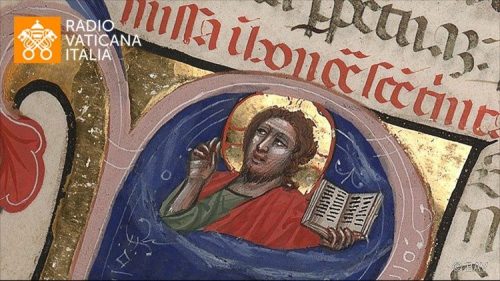READING OF THE DAY
A Reading from the Letter to the Hebrews
HEB 4:1-5, 11
Let us be on our guard
while the promise of entering into his rest remains,
that none of you seem to have failed.
For in fact we have received the Good News just as our ancestors did.
But the word that they heard did not profit them,
for they were not united in faith with those who listened.
For we who believed enter into that rest,
just as he has said:
As I swore in my wrath,
“They shall not enter into my rest,”
and yet his works were accomplished
at the foundation of the world.
For he has spoken somewhere about the seventh day in this manner,
And God rested on the seventh day from all his works;
and again, in the previously mentioned place,
They shall not enter into my rest.
Therefore, let us strive to enter into that rest,
so that no one may fall after the same example of disobedience.
GOSPEL OF THE DAY
From the Gospel according to Mark
MK 2:1-12
When Jesus returned to Capernaum after some days,
it became known that he was at home.
Many gathered together so that there was no longer room for them,
not even around the door,
and he preached the word to them.
They came bringing to him a paralytic carried by four men.
Unable to get near Jesus because of the crowd,
they opened up the roof above him.
After they had broken through,
they let down the mat on which the paralytic was lying.
When Jesus saw their faith, he said to him,
“Child, your sins are forgiven.”
Now some of the scribes were sitting there asking themselves,
“Why does this man speak that way? He is blaspheming.
Who but God alone can forgive sins?”
Jesus immediately knew in his mind what
they were thinking to themselves,
so he said, “Why are you thinking such things in your hearts?
Which is easier, to say to the paralytic,
‘Your sins are forgiven,’
or to say, ‘Rise, pick up your mat and walk’?
But that you may know
that the Son of Man has authority to forgive sins on earth”
–he said to the paralytic,
“I say to you, rise, pick up your mat, and go home.”
He rose, picked up his mat at once,
and went away in the sight of everyone.
They were all astounded
and glorified God, saying, “We have never seen anything like this.”
WORDS OF THE HOLY FATHER
“To follow Jesus you have to take risks”, without fear of “appearing ridiculous”, and without trying to be “too polite”; and in this, “women are better than men”. During Mass on Friday, 13 January, in the Santa Marta chapel, Pope Francis renewed his invitation to the faithful not to “remain seated in life, looking on motionless”.
In his homily, Francis drew from the Gospel for the day (Mk 2: 1-12), which recounts the arrival of Jesus in Capernaum: “So many people follow Jesus, always. Here, there was no room for anyone, even about the door”. But “one could think that those people followed Jesus for their own interests, to get something; and it might be: health, a word of comfort”. Perhaps, the Pope added, “the purity of intention was not complete; it wasn’t exactly perfect, it’s always mixed up, even in us”. Moreover, noted Francis, “how often do we too follow Jesus out of some interest, for some reason, because it is convenient”. Indeed, “purity of intention is a grace that is found along the way: the important thing is to follow Jesus, to walk behind Jesus”.
Therefore, the Pontiff explained, the Gospel tells us that those people “followed Jesus, walking. They sought him because there was something in Jesus that attracted them to him: that authority with which he spoke, the things he said and how he said them; he made himself understood”. Jesus also healed people and many followed him [hoping] to be healed”. So many would do so that “a few times Jesus rebuked them when he realized that they sought him out of mostly material interests”. For example, the time when he said to the people, after the multiplication of the loaves: ‘But you are seeking me not to hear the word of God but because I have given you to eat!’”. And he said this “to illustrate the difference”.
There were occasions, the Pope said, in which “people wanted to make [Jesus] king, because they thought: ‘this is the perfect politician and with him, things will go well: there will be no problems’”. But the people were wrong to think this way, the Pope said. And indeed, “Jesus went away; he hid himself”. But it is also true, the Pope observed, that “Jesus always allowed people to follow him with this somewhat incomplete, imperfect purity of intention, because he knew that we are all sinners”.
In fact, “the biggest problem”, Francis insisted, “was not those who followed Jesus, but those who remained motionless”, those who stayed “idle, on the sidelines, watching from their seats”. In his Gospel, Mark writes: “some of the scribes were sitting there”; they were not following Jesus but “were watching from the balcony; they were not walking along the path of their own lives. They were ‘balcony-watching’ life. They never took a risk; they only judged; they were the pure ones and did not want to get involved”. And even their “judgments were obstinate”. Mark recounts that seeing the crowd around Jesus, they were “thinking in their hearts: ‘What ignorant people, what superstitious people’”! But, the Pope admitted, “how often when we see the piety of simple people, does that clericalism come to mind which does so much harm to the Church, and we judge simple people”, thinking of them as “superstitious”.
Of course, the Pontiff noted, “people are sinful, as I am a sinner; we all are”. But people “seek Jesus, seek something, seek salvation”. Instead, that group of men “were there, idle, on the balcony, watching and judging”. And, “there are other ‘idle’ people in life”, the Pope observed. He referred to the Gospel of John (5: 1-9), which recounts the healing of the paralytic man who had lain by the pool of Bethzatha in Jerusalem for 38 years. Francis described him as having “nothing to do”, without hope, “swallowing his own bitterness”. This man, too, “is another idle one who did not follow Jesus and had no hope”.
Instead, “the people who followed Jesus took risks”, the Pontiff explained. “They took risks to meet Jesus, to find what they wanted”. Just think, he continued, of the episode recounted in the day’s reading from the Gospel of Mark: “Unable to bring the paralytic to Jesus, because of the crowd, the people who accompanied him removed the roof above where [Jesus] was standing and after they made an opening, they lowered the pallet”. In doing so, added Francis, “these men took a risk when they made the hole in the roof: they risked that the master of the house would sue them, take them to court and make them pay. They took a risk, but they wanted to go to Jesus”.
In this regard, the Pope also recalled the testimony of the woman who had been suffering from blood loss, “who took a risk, when in secret, she wanted simply to touch the hem of Jesus’ garment. She risked public shame; she took a risk”, the Pope continued, because “she wanted her health; she wanted to get to Jesus”. Referring to another Gospel story, Francis added: “let us think of the Canaanite woman who risked being called a ‘dog’, but she said to Jesus: ‘Yes, yes, but you can heal my daughter’”.
Moreover, he continued, “let us think of the sinful woman in the house of Simon: she entered, desperate, crying, her hair all disheveled, carrying perfume in her hand. And Simon looked at her and said: ‘shameless: if this man were a prophet he would know what sort of woman this is’”! That woman too, “risked being judged”. Just as the Samaritan woman took a risk when she began to question Jesus: as an adulteress, she risked and found salvation”.
These are all stories of women, in fact. That’s probably because, the Pope said, “women take more risks than men. It is true: they are better and we have to recognize this”.
“Following Jesus is not easy” the Pontiff continued, “but it’s wonderful and always one takes risks, and often one becomes ridiculous”. But “you find something important: your sins are forgiven”. Because “behind that grace that we ask for — good health or the solution to a problem, or whatever — there is the desire to be healed in the soul, to be forgiven”.
In fact, Francis continued, “we all know that we are sinners and that’s why we follow Jesus to encounter him”. And we “risk” in thinking: “‘do I take a risk or do I follow Jesus always according to the insurance company’s rules?’. Up to this point: do not be ridiculous, do not do this, do not do that”. But Jesus should not be followed “too politely”. Indeed, by doing so, “you remain seated” like the scribes in the Gospel “who judged”. Instead, “following Jesus because we need something”, and also taking personal risks, “means following Jesus with faith: this is faith”.
So we should place our trust in Jesus, trust Jesus”, and particularly, “with this faith in his person”, Francis reiterated. And here, the Pope again recalled the Gospel passage in which the men made the hole in the roof in order to lower the paralytic’s pallet down “to Jesus, so that he could heal him”.
In conclusion, the Pope suggested that we make an examination of conscience by asking ourselves some essential questions: “Do I trust Jesus, do I entrust my life to Jesus? Am I walking behind Jesus, even if I may seem ridiculous at times? Or am I sitting down, watching as others do, watching life? Or I am sitting with a ‘seated’ soul, so to speak, with a soul closed by bitterness, a lack of hope”? And, he concluded, “each of us can ask ourselves these questions today”.
(Santa Marta, 13 January 2017)

